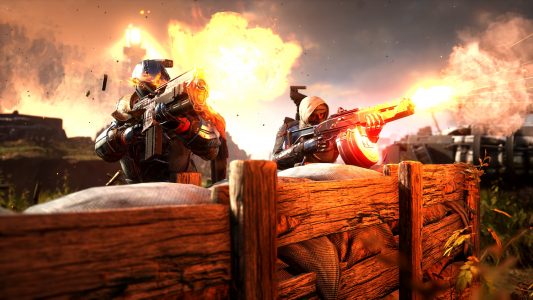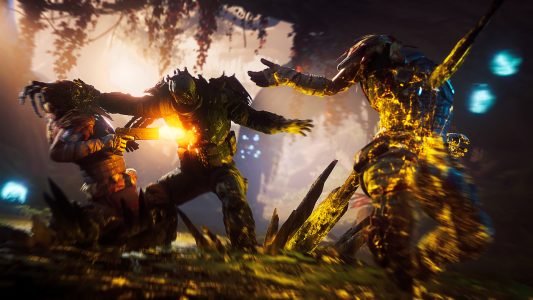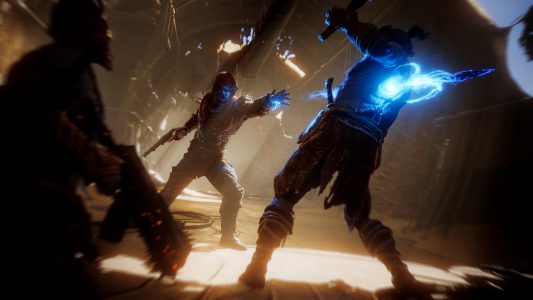943
The dialogue, in contrast to the plot, is often brilliant, and some of the imagination that’s gone into this setting is truly wonderful. So there’s this weird pendulum effect going on where I swing back and forth between “I’m really loving this!” and “Ugh, that’s so dumb…”
I’ve been playing Square Enix’s new looter-shooter “Outriders” for the last couple of days, in between work and fleet ops, and I’ll lead with my overall verdict: I’m enjoying it! It’s a damn good game, and you should play it too. 7/10
The reason I’m not giving it a higher score than that, despite the fact that I do wholeheartedly recommend you play it, is because it has one glaring flaw: the writing is, for the most part, awful. If that fact doesn’t matter to you, I’ll bump my rating right up to a 9/10 instead and you can skip past the rant I’m about to deliver and go look at my impression of the game on its other merits, toward the bottom.
If good storytelling does matter to you, though, please: read on.
Don’t Play for the Story
The abysmal quality of the writing is apparent right from the game’s opening cutscene. The white-text-on-space crawl, mercifully short, reads as follows:
“Earth was Dead. We had destroyed it. Two colony ships were built to carry us across the stars. Only one ship made it. We’re all that’s left. After an 83-year journey, we orbit our new home. The planet Enoch.”
This is the prose equivalent of mayonnaise on white bread. “I wrote some words. They formed a sentence. Some more words followed. They formed more sentences. None of them were very interesting. I like chocolate milk.” I’m not calling for overwrought melodrama here, but you’d think the literal apocalypse and extinction of mankind would be delivered with slightly more emotion. Where’s the sad voice-over? Where’s the extinction montage? Where’s the upbeat note of optimism at the prospect of a new start on a distant alien world, soon to be shattered by horrific reality?
From this inauspicious beginning follows a narrative crafted around the bleakly misanthropic philosophy that people really, really fucking suck. Oh, and that verisimilitude plays a distant and quiet second fiddle to spectacle.
It’s stressed from the get-go that the colony ship Flores, humanity’s last hope of avoiding self-imposed extinction, arrived with a mere half a million people on board while billions were left behind to die on Earth. But despite this fact and an alleged resource crisis, AND the planet actively trying to kill everyone, we’re expected to believe that what happened shortly after arrival was a grinding three-decade-long trench war. One that makes the Somme look like a day at the beach, which is still going to the present day, and with no apparent shortage of physically fit soldiers. Most of them stacked in shoulder-high corpse piles.
Sorry. I don’t buy it.
There are many more things I don’t buy. That the job of green-lighting the colonization effort would be given to an egotistical snob more concerned with his image than with actually doing his job properly; that his good image wouldn’t depend on him doing his job properly; that your early-game human foes are so evil and deserving of being your enemy that they literally roast and eat newborn babies; that the planet-wide Anomaly that’s so deadly to most but which gave your protagonist their superpowers wasn’t clearly visible from space; that the drop pods you go to retrieve during the prologue couldn’t communicate with a ship in orbit, something my phone can do; that despite the Enoch Colonial Authority being on the verge of “running out of food and bullets” according to their commander, they’re still fielding modern tanks. And so on, and so forth, et cetera.
Oh. And don’t get me started on the McGuffin. During the prologue, your character discovers a Mysterious Important Radio Signal that suggests there’s somewhere safe out there where humanity can begin anew, because it’s broadcasting loud and clear despite the fact the Anomaly fries any and all electronics beyond repair. Except for everyone’s personal radio communications. And the holographic sights on your gun. And the tanks and trucks. And the cryopod you spent thirty years in. And the Overly Complicated SciFi Doors…
…Where was I? Oh yeah. Anyway, your character writes the frequency in Sharpie on their palm before being injured and put in cryostasis. Upon waking up thirty years later and reuniting with their old comrades, they are told “We couldn’t pinpoint the source of the Mysterious Important Radio Signal because we didn’t know the right frequency.”
Uh…Radio frequencies don’t work that way.
All of this may sound like nit-picking, and the fact is, I was able to look past it and thoroughly enjoy the actual gameplay (more on that shortly.) But by far and away, for me, this game’s greatest flaw is that its genuinely interesting setting and excellent gameplay are squandered by the kind of half-assed, uninventive, thoughtless story and presentation a second-rate hack ought to be embarrassed by. How the hell this met Square Enix’s standards without anybody once standing up and pointing out that the plot has more holes in it than a pair of Crocs is beyond me.
Nowhere is this shoddy authorship more evident than in how impatient the writers seem to be to kill off characters.
Now, don’t get me wrong. As an author myself, I’m all for character deaths, and there’s definitely added value in them when they strike out of the blue and catch the audience unaware. That’s a necessary and potentially potent tool in the writer’s kit. But they have to matter. The ones in the game’s prologue succeed in mattering, or at least in being narratively useful, but as you get into the actual meat of the plot, well…
So far I’ve seen a number of well-developed characters with interesting back-stories receive enough of an introduction to suggest they’ll play some kind of a supporting role, and then…splat. Dead out of nowhere. Or if they’re lucky, just left behind and forgotten.
One character in particular was abruptly killed off in a sudden, pointless manner halfway through chapter 2, minutes after joining the protagonist’s group and seconds after a crowning moment of badassery. Wasted for shock value, made all the worse by the fact that they’d been built up just enough to pique my interest, but not enough to have established any real affection.
My shock at that death was over how narratively worthless it was, not over losing a valued companion. That death simply didn’t do anything.
I’d say it seems like a case of Fridging, but it’s even shallower than that, because the entire point of Fridging is that the surviving characters are affected by the death, and undergo a shift in their attitudes and motives, which…doesn’t happen in this case. The survivors, including the idiot whose naivety got this character killed, hold a perfunctory funeral then move on unchanged.
I don’t know if the idea was to show that these people are so traumatized and surrounded by death that seeing a close friend die is basically a Tuesday for them, but mostly I just get the impression that the writers were going for shock value and weren’t patient enough to get the best out of it.
Oh. And the bit where my character just stood there and watched a cult leader execute the guy I’m there to rescue? When I’m playing a goddamn sniper and could have shot his head off at any time during his three-minute righteous monologue? That was annoying. More games need to have Mass Effect-style interrupts rather than leave the protagonist to watch gormlessly as the hostage is thrown off a cliff, fifty feet from where they’re standing.
The funny thing is, none of this would bother me so much if it wasn’t for the fact that Outriders occasionally manages to blindside me with a sudden moment of genuinely excellent storytelling. The moment when the Anomaly Storm first hits and your fellow Outriders start dying all around you felt truly desperate. The palpable confusion and horror of waking up from cryostasis to a hell right out of the First World War is superbly delivered.
Then there are some of the characters who do actually stick around long enough to matter. Shira Gutmann’s transition from smiling, optimistic colonial scientist to bitter, half-blinded war leader is heartbreaking. Jakub Dąbrowski somehow manages to balance both grim grounding and comic relief, and his shared past with the protagonist leads me to genuinely like him. The mysterious Seth strikes me as having true depth to his motives and philosophy, despite his limited screen time so far, and I would have loved to hate Charles Maxwell for longer. Your character has plenty of personality too, despite necessarily being an Everyman.
Then there are some of the characters who do actually stick around long enough to matter. Shira Gutmann’s transition from smiling, optimistic colonial scientist to bitter, half-blinded war leader is heartbreaking. Jakub Dąbrowski somehow manages to balance both grim grounding and comic relief, and his shared past with the protagonist leads me to genuinely like him. The mysterious Seth strikes me as having true depth to his motives and philosophy, despite his limited screen time so far, and I would have loved to hate Charles Maxwell for longer. Your character has plenty of personality too, despite necessarily being an Everyman.
The dialogue, in contrast to the plot, is often brilliant, and some of the imagination that’s gone into this setting is truly wonderful. So there’s this weird pendulum effect going on where I swing back and forth between “I’m really loving this!” and “Ugh, that’s so dumb…”
Play it for the Looting and Shooting
So. Now that I’ve ranted so freely, you may be wondering why the hell I’m giving it such a high rating. And the answer is that, abysmal but sporadically wonderful writing aside, it’s a really, really damn good example of a co-op looter-shooter.
Mechanically, it’s tight and polished. Movement feels solid, and the sticky-cover is sticky enough without causing me to die from gluing myself to the wall like a man strangely eager for the firing squad. The gunplay is bloody magnificent: I haven’t yet used a weapon that didn’t feel satisfying to fire, from the sound effects to the performance, to the death effects and kill animations. The headshot detection and netcode are both right in that sweet spot where they reward my skill without making it too easy to dome every bad guy I see. For me, there’s absolutely nothing to criticize in the way this game plays.
As for the gear and crafting system, well, it’s a looter-shooter. Frankly, I don’t see why they even bothered to include green and white loot at all, as you will never use them: gear effects are too useful, and only appear on blue loot and above. You will always pass over a high-level green weapon for a lower-level blue one with a useful effect. Fortunately, the scrap-and-upgrade system is pleasingly generous and, importantly, you can tag all the stuff you want to scrap instantly just by right-clicking on it before scrapping it all in one go. And you get a lot of resources from scrapping, too.
Having spent far too long in menu hell scrapping my unwanted crap in other games, and getting hardly anything useful for my trouble, I think this aspect is one of Outrider’s true strengths. My only real gripe here is you have to go talk to a specific NPC to tinker with your gear, rather than being able to do it straight from your inventory menu while in a home area.
The four classes, their skills and their equipment bonuses all play together well. I’m playing a Technomancer, focusing on ranged DPS, and I’m already finding some great ways to synergize my skills and gear, not just internally but with the other classes too. Technomancer is a long-range, squishy, kitey sort of class and some of the close-range and melee enemy types are a fantastic counter to me, but I in turn am a fantastic counter to the enemy types that cause trouble for the close-range Devastator and Trickster classes. So far, none of my squad seem to be the one guy who’s doing all the work: we’re all useful, and the game smoothly scales encounters to squad size to keep you feeling challenged.
Final Thoughts
As a visual spectacle, it’s wonderful. I haven’t yet seen an environment that wasn’t gorgeous, even the war-torn blasted trenches being beautiful in their hellish way. Better yet, it performs well even on quite elderly machines. I’m currently saving up to replace my venerable GTX 1050 Ti, and the game looks good and runs well for me even on Ultra graphics settings. A testament to just how good the Unreal Engine really is, that.Audio? As I mentioned above, the diamond in the midden for this game’s writing is often the dialog, and I especially enjoyed the vocal performances of Dmitry Chepovetsky and Marcel Jeannin. It’s a little disappointing that the soundtrack doesn’t include anything particularly memorable, considering how iconic other Square Enix soundtracks have been, but the sound effects are all solid, physical, and right.
There are bugs—of course there are, it’s Early Access—and the worst of these so far seems to be a display bug that causes your entire HUD to vanish. I was fortunate enough to avoid this, but my friend was not, and it’s a sufficiently widespread problem that there are tutorials on YouTube about how to fix it. Another bug I encountered caused my game to crash when my friend quit, if I’d joined him via Steam game invite. If we joined each other through the in-game squad finder, it didn’t happen. But again, this is an Early Access game. Bugs are inevitable, and frankly the game has acceptably few of them.
So, overall, I’m genuinely enjoying it, and highly recommend you should play it. You just…have to turn off your brain and not think too critically about the writing, I guess.
If you do, I guarantee you’ll have fun.




